Does Carswell Prison Still Deserve Nickname as ‘Hospital of Horrors’? Yes.
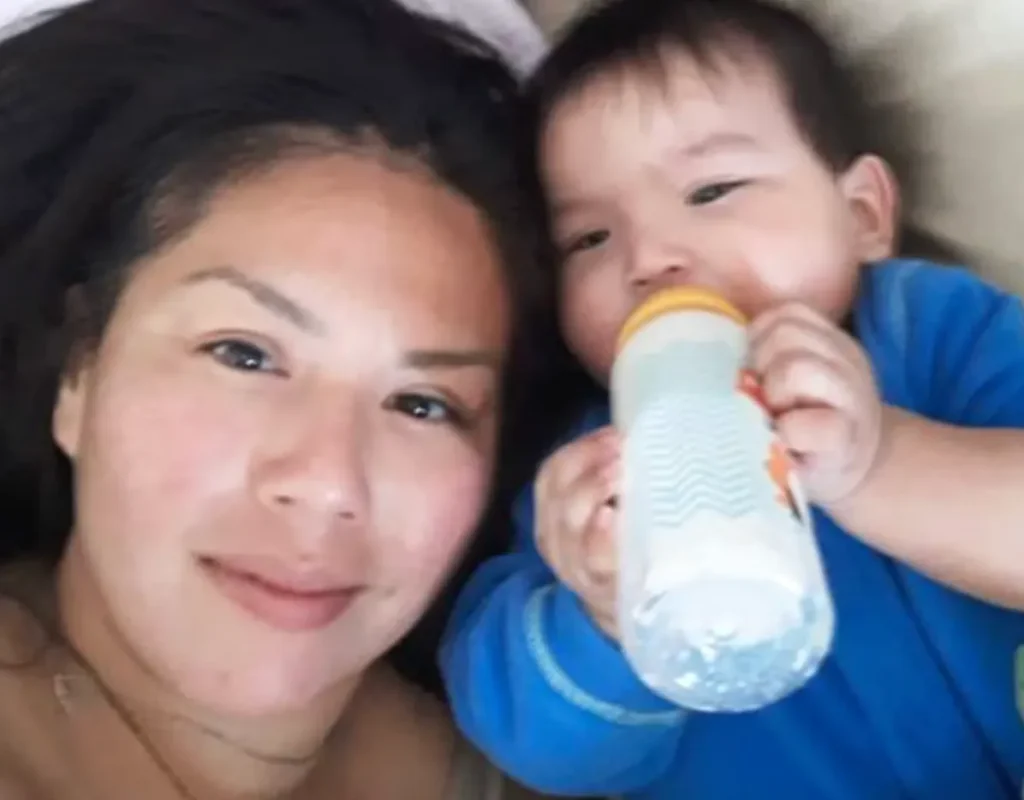
Clara LeBeau, High Bear’s grandmother, filed a civil suit for wrongful death in March 2023. She claims the death was due to improper medical treatment and unsafe conditions at FMC Carswell. Concerns about issues at this facility were the subject of a previous article by The Daily Muck.
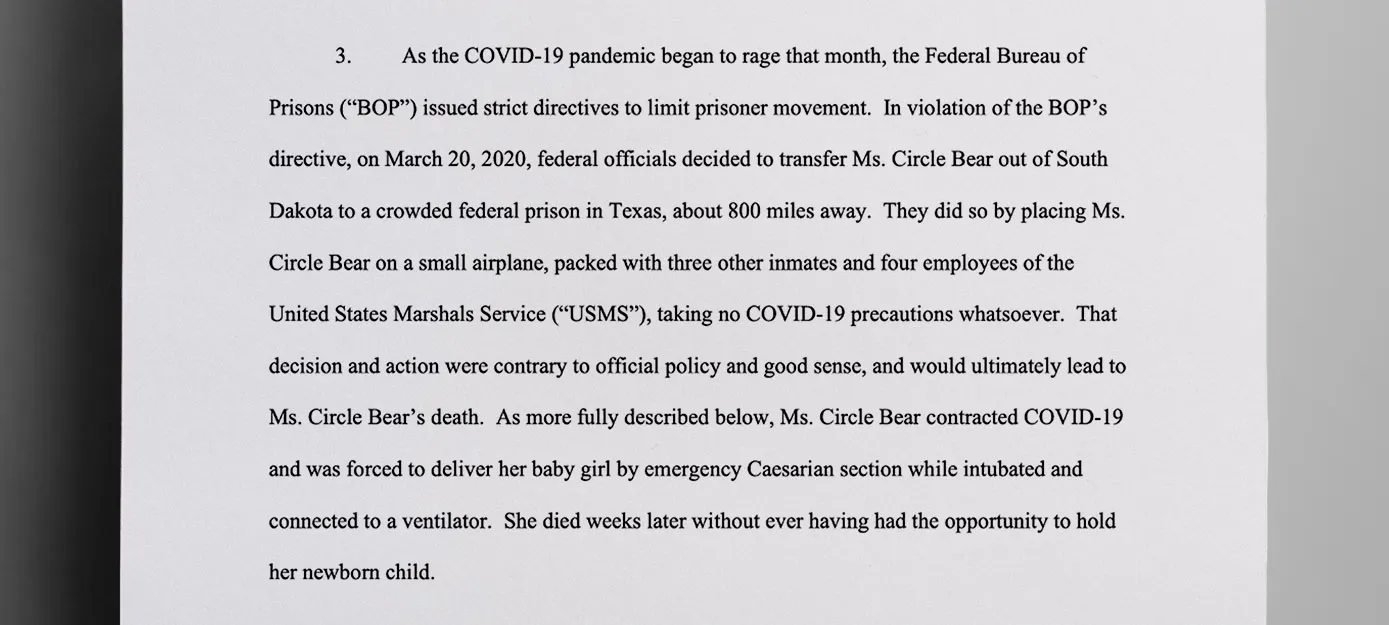
High Bear was a member of the Cheyenne River Sioux Tribe. She asked LeBeau to care for her children while she was in prison.
On April 19, LeBeau drove from South Dakota to Texas to retrieve baby Elyciah from the hospital to take her home. High Bear was in an induced coma and on a ventilator at that time. She never woke up.
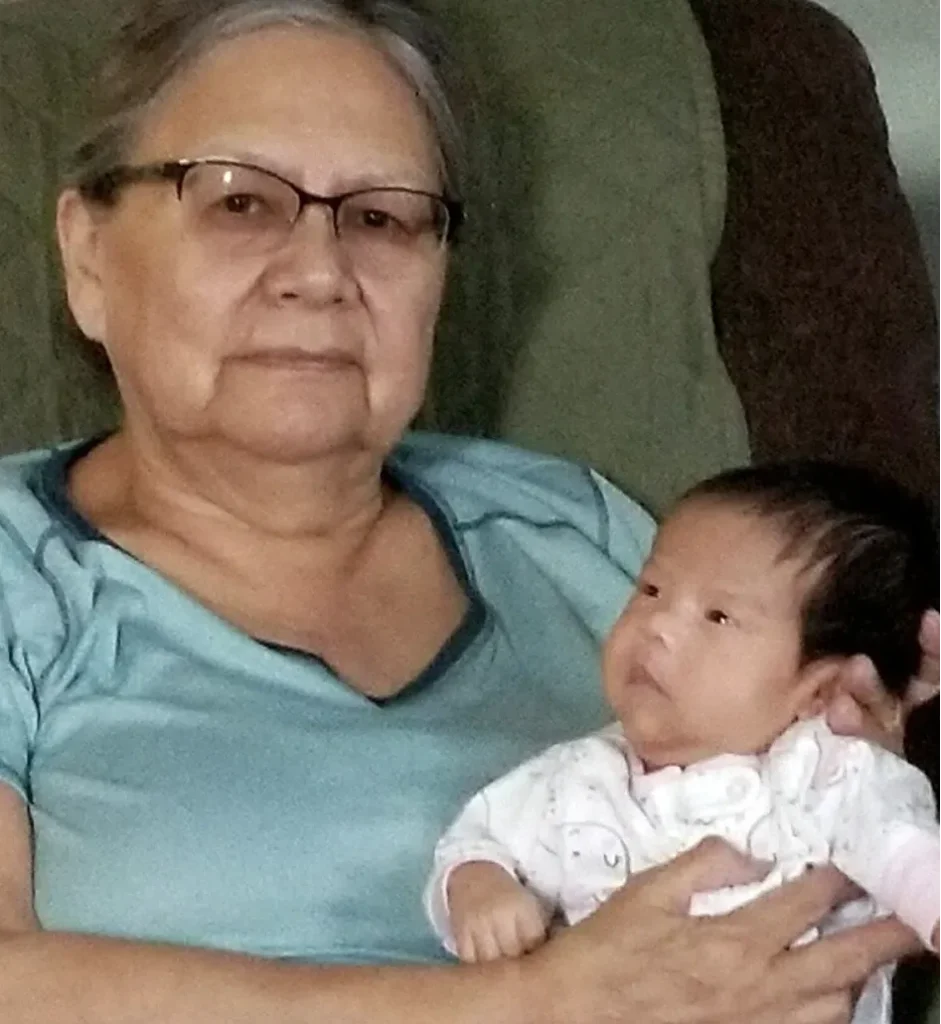
High Bear was the first federal female inmate to die during the COVID-19 pandemic. Five other Carswell inmates died before August 2020. One of those contracted the virus after being put in a cell with a COVID-positive inmate, the lawsuit claims.
High Bear, a member of the Cheyenne River Sioux Tribe in Eagle Butte, S.D., is also referred to by her married name of Circle Bear in some news accounts and official documents. Her obituary and articles featuring her family members indicate they prefer using her maiden name. Her divorce became final shortly before her death. The Daily Muck will use the preferred name, High Bear, except when included in quotes from cited sources.
A ‘Death Sentence’ for Selling $850 of Meth
High Bear was indicted on March 12, 2019, for selling about $850 worth of meth to an undercover informant in April 2018, Elle magazine reported in a June 30, 2020 article.
She pled guilty on Oct. 7, 2019, and was sentenced to 26 months on Jan. 14, 2020, for “maintaining a drug-involved premises” where methamphetamine was sold, the Attorney General’s Office for South Dakota reported in a Jan. 15, 2020, press release. She went to Carswell on March 20 as the COVID-19 pandemic was exploding across the country.
“It is a federal crime to knowingly allow a drug dealer to operate out of your home, apartment, or place of business,” U.S. Attorney Ron Parsons said in the January 2020 press release. “Don’t let yourself or your property get mixed up in the world of illegal drugs. It ends badly.”
Parsons had no way of knowing then just how badly it would end or that a 26-month prison term would become a death sentence.
Allegations Against Carswell, BOP
“The federal government needlessly transferred Ms. Circle Bear, then seven months pregnant, over 800 miles from South Dakota to the FMC Carswell women’s prison in Fort Worth, Texas,” attorneys Katie Rosenfeld and Max Selver said in a March 2022 press release announcing the $20 million wrongful death lawsuit against the U.S. government.
“During the transfer and while at FMC Carswell, Ms. Circle Bear was confined in overcrowded and unsafe conditions that were ripe for COVID-19 transmission,” the attorneys’ release said. “The Marshals Service transported Ms. Circle Bear on a small plane with at least six other people and no masking, social distancing, pre-flight COVID testing, or any other safety measures.”
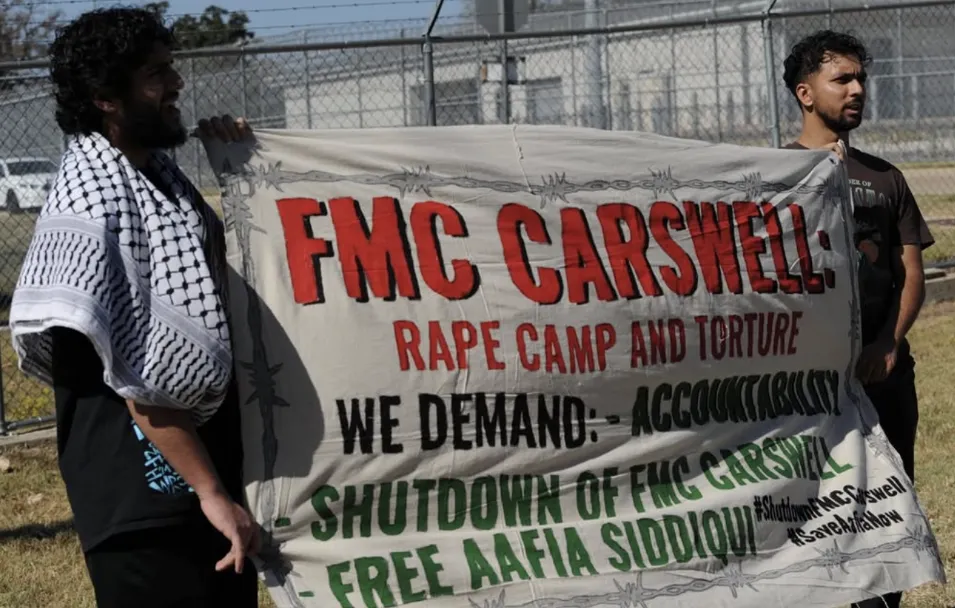
LeBeau’s attorneys cited a U.S. Marshals Service employee’s email in early March 2020 stating High Bear’s transfer, and that of another pregnant inmate, “could wait until they have the babies.” Another USMS employee disagreed, saying, “We do NOT want to wait until they have their babies” and that the other inmate should be “moved ASAP.” That woman’s baby was due in April.
“The employee did not indicate that it was important for any reason to move Ms. Circle Bear ‘ASAP’ or that there was any pressing need to move the two pregnant inmates simultaneously,” the suit contends.
Had High Bear served her sentence in home confinement or a local jail, she may have celebrated her daughter’s 4th birthday on April 1.
“At the time Ms. Circle Bear was transferred to Texas, the state had approximately 175 confirmed cases of COVID-19, including some in Tarrant County, where FMC Carswell is located,” the lawsuit notes. “On March 13, 2020 — a week before Ms. Circle Bear’s transfer — Texas Governor Greg Abbott declared a state of disaster due to the rising number of confirmed COVID-19 cases” in Texas.
The suit points out there were “no reported COVID-19 cases in Tripp County, South Dakota, where Winner City Jail is located.”
The lawsuit alleges medical staff did not recognize and treat High Bear when the COVID symptoms began. The local hospital took emergency measures, but it was too late. Doctors put her in an induced coma from which she “never awoke,” the suit states. “She died about four weeks later.”
The suit also claims that records “show that about two weeks before Ms. Circle Bear’s death — while she was intubated and in an induced coma — BOP medical staff altered her medical records to downplay the seriousness of her symptoms in the period before she was hospitalized.”
Four in a Cell, No Masks, No Soap
High Bear’s pregnancy was “high risk.” Her other five children were born by Caesarean section. Doctors scheduled the C-section for May 7 at a Pierre, S.D. hospital, 90 minutes from the jail where she was being held.
“When she arrived at FMC Carswell, BOP housed her on the bottom bunk bed of a small cell with three other women with no masks or other PPE, one shared toilet and sink, and no soap,” the attorneys wrote.

COVID symptoms began on March 26. The staff “failed to provide her with prompt or adequate care for several days as her symptoms intensified,” the attorneys allege.
Upon transfer to a local hospital on March 31, “she was almost immediately intubated,” Rosenfeld and Selver said. Elyciah Elizabeth Ann High Bear was born by emergency C-section on April 1.
The mother of six young children “died four weeks later (on April 28) without ever getting off the ventilator to meet her daughter,” the suit states. The government’s “indifference and recklessness in exposing Ms. Circle Bear to COVID-19 and failing to provide her adequate medical care caused her death and left her children motherless,” the attorneys claim.
An ‘Outrageous’ Case With Fatal Consequences
Former Utah U.S. Attorney Brett Tolman told the Arnold Ventures online site in May 2020 that prosecutors never should have pursued the charge.
Tolman is the founder of the Tolman Group and a well-known prison policy reform advocate. The statute prohibiting “maintaining a drug-involved premises” refers to a drug deal occurring in the defendant’s house, he said. In his 20 years as an attorney, Tolman said he never saw this charge prosecuted in federal court.
“Prosecutorial discretion should have been exercised to not bring a case like this against a woman who may not have had the ability to prevent what was going on in (the) home,” Tolman said in that article. He said the criminal justice system failed High Bear “at every single point.”
Attorney Elena Fast of the Fast Law Firm in New York has defended many charged with federal drug crimes. Prosecution under the so-called “crackhouse law” is one of those where prosecutors have wide leeway in how, or even whether, to prosecute.
“Some jurisdictions will charge this as a separate crime, especially if the person is actively selling drugs out of the house,” Fast told The Daily Muck. “Other jurisdictions use it as a kind of ‘bonus’ charge, to enhance the penalty for other drug charges by increasing the federal guidelines for sentencing by two levels.”
Prosecutors also use it as a bargaining chip to entice a suspect to plead guilty to that crime instead of a more serious offense with a longer sentence.
‘She Never Should’ve Been in Custody’
Deidre von Dornum, the attorney in a 2020 lawsuit seeking improvements in anti-COVID measures at federal facilities in New York, told Elle that “inmates’ safety is not a priority. Each of the deaths in custody seemed to me likely to be preventable.”
In light of High Bear’s pregnancy and nonviolent history, Von Dornum said the judge could have – and should have – sentenced her to home confinement.
“Her case seemed particularly upsetting,” Von Dornum told the magazine. “She never should’ve been in custody in the first place at that stage in her pregnancy.”
While there are no allegations prosecutors targeted High Bear or treated her case differently because she was Native American, Elle pointed out the case underscores “a grim reality for Native women in South Dakota. While Native American women make up only 9 percent of the state’s population, they are almost half of its female inmates.”
Latest Action on High Bear Lawsuit
U.S. District Judge Lawrence L. Piersol rejected the government’s argument that various federal and state laws grant it immunity from the suit. In that November 2023 decision, he told both sides to file briefs on their arguments.
The government filed its response in December 2023. LeBeau’s attorneys have received extensions to file theirs.
“Plaintiff’s claims arising from the death of Ms. Circle Bear raise questions about the government’s decision to transfer from a jail in South Dakota to a prison in Texas, as well as to the circumstances of the flight, and her treatment at FMC Carswell and a local hospital once she arrived,” Pierson stated in the order.
The judge said the suit “alleges negligence and wrongful death in all facets of the transportation and treatment of the decedent with respect to her transfer to FMC Carswell.” The prosecutors claim various federal and state laws shield it from the suit’s claims.

“The claims in Plaintiff’s lawsuit arise from a tragic situation and merit close scrutiny,” Piersol wrote in his order. For that reason, he said allowing LeBeau time to address the government’s immunity claims is “in the interests of justice.”
What Care Is Available
FMC Carswell is one of the BOP’s six major medical centers and the only women’s center. It provides medical and mental health care to patients with significant conditions and ailments. This includes cancer, stroke, dialysis and high-risk pregnancy, attorney Alan Ellis explains in a report about BOP medical care.
“Most federal prisons have a full-time medical staff on hand and/or contract medical staff from the community,” Ellis’ article states. “A local community hospital provides contract services for inmates who are in need of inpatient care because of a medical emergency. Normally, prisoners in need of special medical attention due to complex health problems will be designated to one of the BOP’s six major medical centers.”
Deaths In Custody Statistics for 2020
There were 614 federal in-custody deaths in 2020, the DOJ’s Bureau of Justice Statistics reported in June 2022. Most were in BOP facilities, but some were in custody of other federal agencies. Specific facility information is not included in that report.
Andi High Bear was one of 29 female inmates who died in federal custody that year. She was also one of 27 deaths from COVID among all federal inmates in 2020. The BJS said 491 deaths (84.1 percent) were due to illness or natural causes. Of those, 452 died in the prison infirmary, mental health unit or a local hospital.
A Disturbing Report
In its February 2024 report “Evaluation of Issues Surrounding Inmate Deaths in Federal Bureau of Prisons Institutions,” the Office of Inspector General examined 344 federal inmate deaths from 2014 to 2021 that were due to suicide, homicide, accident and unknown causes. The report does not address the deaths of inmates from illness and natural causes. It does criticize the BOP’s “response to medical emergencies.”
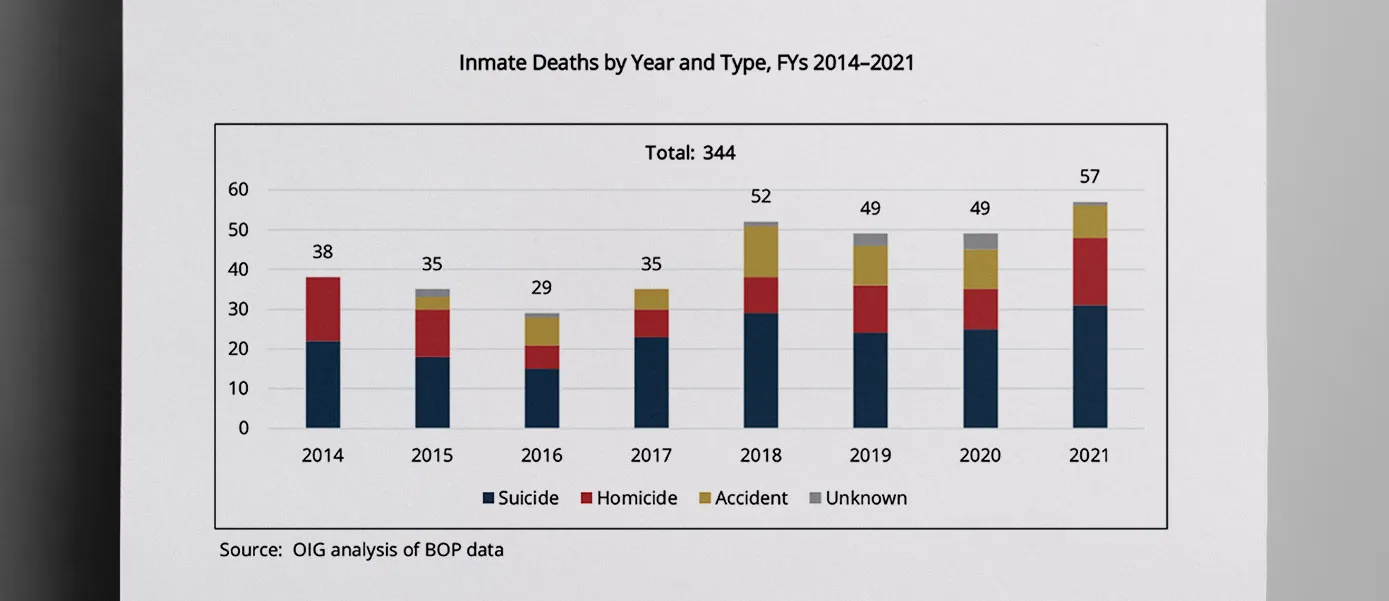
Those findings included:
- 48 percent (166 of 344) of inmate deaths involved “deficiencies in connection with BOP staff’s response to the inmate’s medical emergency.”
- There was a lack of required internal and external reviews following inmate deaths. The internal review by clinical personnel “is designed to shed light on both the sequence of events leading to the death and the cause of death.” There was no external review in 22 percent of the deaths. This review provides “perspectives on strengths and weaknesses in healthcare delivery surrounding the death” and recommendations to improve those practices.
- There was a failure to respond timely – or at all, in some cases – to outside reviews.
In its response, the BOP said, “Any unexpected death of an adult in custody (AIC) is tragic.” The bureau has “taken many steps to mitigate these deaths, and we welcome OIG’s recommendations as a way to further our efforts.”
The BOP’s priority is to “address the physical and mental health needs of those in our care and custody.” It pointed out that inmates “have often engaged in high-risk activities prior to incarceration that predispose them to acute and chronic illness, including higher incidence of mental illness, and substance use disorders.” It noted almost 32 percent of federal inmates have an identified substance use disorder, compared to 16.5 percent in the general population.
The BOP said it “will continue to enhance procedures to ensure that all required death-related records are completed and collected consistently and in accordance with established deadlines.” It stated it has “already begun substantive improvements to its mortality review and record tracking systems, most of which were implemented between June 2023 and January 2024.”
Nonprofit Inspects Carswell
The nonprofit District of Columbia Corrections Information Council inspected Carswell in September 2017 to determine how 17 Washington, DC, inmates were being treated. The organization issued its report in July 2018. That number was a small fraction of the approximately 1,200 inmates incarcerated at Carswell at that time.
The CIC reported 12 deaths in custody from September 2016 to August 2017, “all from natural causes.”
Half of the DC inmates were “very satisfied or satisfied” with the prison’s medical care, 27.3 percent with the quality of mental health care and 25 percent with the dental care.
The inspectors noted a medical staff shortage, including vacancies for six nurses and three nurse practitioners, which was a factor in inmate complaints of long wait times to receive scheduled medical care.
The BOP responded to the nonprofit’s report in a letter, writing, “Throughout the report, unsubstantiated allegations are made without direct observation by the CIC or supported by facts that can be corroborated. The administrative and supervisory staff at FMC Carswell ensure all staff conduct themselves in a professional manner and in accordance with all laws and policies which govern the Bureau.”
“The Bureau takes allegations of misconduct seriously,” the BOP continued. “If provided with specific case information, the Bureau will assist in any assessment and investigate.”
Mortality Review Stats Leave Unanswered Questions
The BOP inmate mortality statistics don’t show whether medical inattention or malpractice played a part in deaths. The Reason Foundation requested that information for Carswell and the women’s prison in Aliceville, Alabama. The BOP refused to release that information.
The foundation filed a lawsuit in February 2023 seeking records related to FMC Carswell deaths. On Aug. 1, U.S. District Judge Christopher R. Cooper sided with the BOP and denied the foundation’s request.
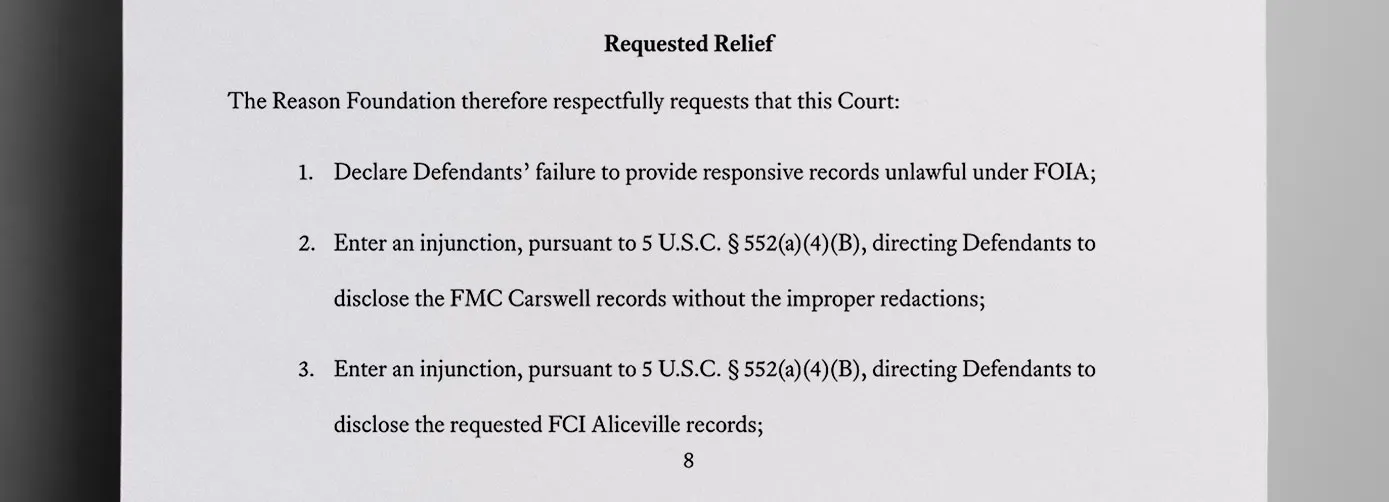
Cooper said the BOP requires a mortality review “when an inmate dies in custody unless legally authorized by execution.” A Mortality Review Committee “interviews staff, reviews the patient’s medical records, and gathers the facts surrounding his or her death.” The committee evaluates individual and system performances at the time of the death and “in the days or months preceding the death.”
The judge said the committee identifies strengths and weaknesses of staff and the system “for the clinical care immediately surrounding the death, and the quality of care for at least six months preceding the death.”
Kara Christenson, the DOJ’s public liaison for FOIA requests, argued that mortality reviews include staff not involved in the deceased inmate’s care who “evaluate actions of those who provided care (and) judge whether the provided services were medically acceptable.
“Peer reviews rely on confidentiality to protect professional relationships and team dynamics,” Christenson continued. Making those opinions public would “deter BOP employees from acknowledging mistakes in the future” and “significantly impact the (agency’s) healthcare delivery model.”
A Difficult Task With a Difficult ‘Clientele’
Several BOP reports address the difficulty of recruiting and retaining qualified personnel in its prisons. This includes healthcare providers and security personnel. The healthcare task is even more difficult because of the population these providers serve.
The BOP points out that a large number of inmates have deteriorating health conditions due to their life before prison. Statistics also show that life in prison carries risks of health problems, physical assault and suicide.
Is Carswell’s healthcare system any worse than that of other prisons? Lawsuits, inmate complaints and media reports point to issues that need addressing.
Carswell is not the only prison that has received this kind of attention. Its role as the BOP’s only all-female federal medical center – and society’s tendency to view even “bad” women as vulnerable – make it an attractive target for attention.
To answer the question asked by the headline, Carswell may not be THE “hospital of horrors,” but it is certainly A “hospital of horrors.” It is up to the courts and Congress to take all necessary steps to change that nickname.
For more in-depth features and articles on important issues facing society today, subscribe to The Daily Muck.
Discover More Muck
Induced Into Harm: When Doctors and Hospitals Betray Mother and Child
Feature Raymond L. Daye | Jun 11, 2025

Weekly Muck
Join the mission and subscribe to our newsletter. In exchange, we promise to fight for justice.
Weekly
Muck
Join the mission and subscribe to our newsletter. In exchange, we promise to fight for justice.







